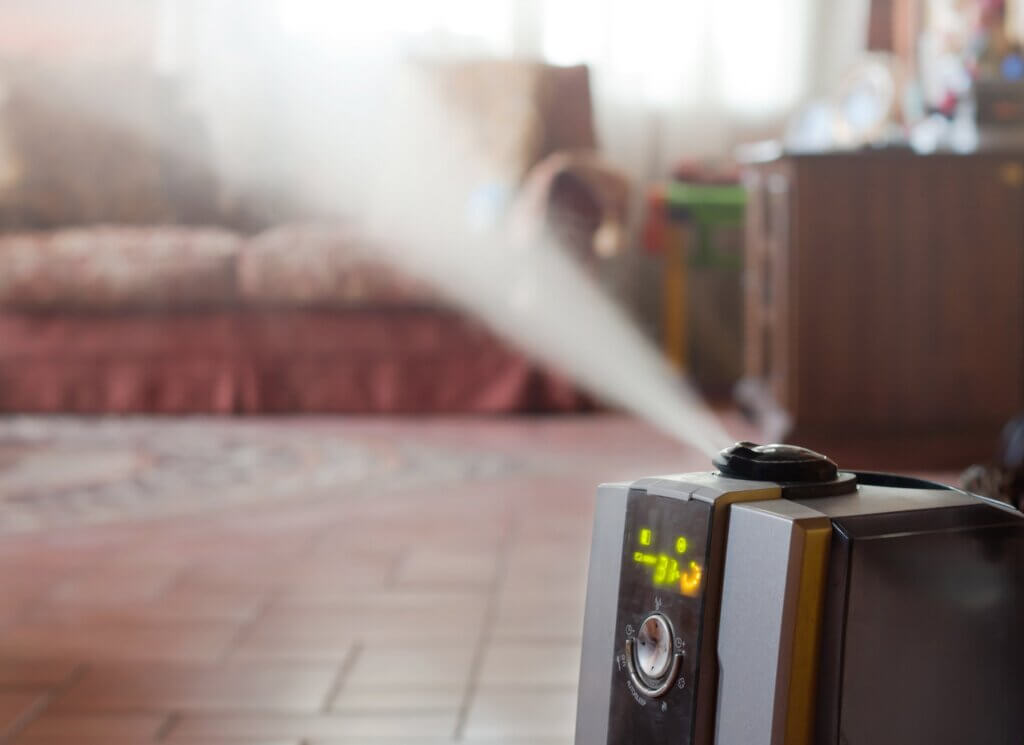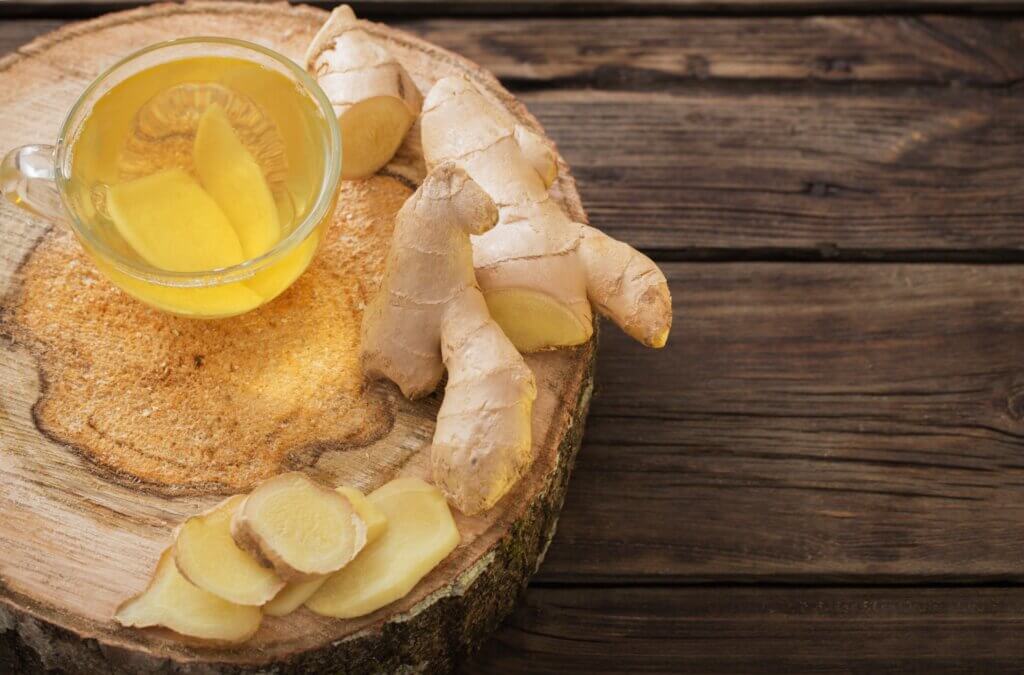How to Relieve a Dry Cough

A dry cough, sometimes known as a non-productive cough, is a very bothersome symptom that is often accompanied by irritation, sore throat, and inflammation. It’s characterized by the absence of mucus, which causes repeated throat clearing. Relieving a dry cough is possible based on some home remedies and strategies, although you should always consult a professional before doing so.
The reason is very simple: although a dry cough can be an isolated phenomenon, it can also appear as a symptom of an infection or other underlying disease. We suggest you use the following tips to relieve a dry cough in the face of sporadic episodes. If they’re very frequent or there’s no clear improvement, don’t put off a visit to your doctor.
7 tips to relieve a dry cough
Under normal conditions, coughing is a reflex of the body to keep the airways clear. A dry cough has the opposite effect, as it irritates the pharynx more and more as the day goes by. Let’s look at 7 things you can do to get rid of a dry cough according to scientists.
1. Buy hard candy
A study published in Pulmonary Pharmacology and Therapeutics in 2015 found that sweet or minty flavors can increase the cough reflex threshold. This isn’t the only mechanism by which candies can help you. In addition to this, by keeping hard candies in your mouth you encourage the production of saliva, which, in turn, can help relieve a dry cough.
Although menthol flavors are a good option, try to avoid those that are excessively menthol. Quite the opposite to benefiting you, these can encourage the dryness and irritation of a dry cough. In the same way, avoid biting them; suck them until they completely dissolve in your mouth.
2. Use a humidifier

Studies and research have supported the use of humidifiers to combat coughs caused by conditions such as chronic obstructive pulmonary disease (COPD) and procedures such as thyroidectomy. The humidifier regulates the amount of moisture present in the environment, allowing you to achieve a beneficial balance for you.
By doing this you can reduce the involvement of airborne particles or allergens, often a source of a dry cough. If the environment is very dry, your mucous membranes can lose moisture, which could also trigger the symptoms. In general, humidifiers are very affordable and can provide parallel benefits to the one outlined above.
3. Gargle with salt water
Gargling with salt water is an age-old strategy to combat colds, flu, coughs, and other complications. They’re a safe, affordable, and fast option to relieve these symptoms. It’s recommended to do so with warm water, and never use them in small children, as they find it difficult to avoid swallowing the water.
4. Take a tablespoon of honey
It’s very likely that you have heard that drinking a teaspoon of honey is useful for relieving a dry cough. Although, of course, its impact is limited, it seems that it does generate positive effects when the symptom is overcome.
A paper published in the Cochrane Library in 2018 found that, compared to no treatment, honey can relieve symptoms of acute cough. Its effects are similar to those achieved with dextromethorphan, according to the researchers.
5. Make infusions with ginger

To continue our homemade options to relieve a dry cough, we suggest making ginger infusions. A study published in the American Journal of Respiratory Cell and Molecular Biology in 2013 found that ginger can attenuate airway hyperresponsiveness, specifically in cases of asthma.
This can have a positive impact on the relief of a dry cough, and the best way to ingest is through infusions.
6. Use some marshmallow root
Experts have found that the use of marshmallow root is highly receptive in the general population to deal with an irritating cough.
We recommend its use in infusions, although you can also find presentations in hard candies. Its use should be moderate in hypertensive people or those who permanently take medicine for an underlying condition.
7. Use capsaicin capsules
There is evidence that orally administered capsaicin powder decreases cough sensitivity and severity. It’s a compound found in chili peppers, essentially it’s the one that gives them their particular spicy flavor. You can find it in capsules, although if you get it in its powder form you can add it to one of the two infusions we mentioned above.
Other things you can do are eucalyptus mist sessions, use air purifiers, take cough syrups and cough drops, and make mint tea. Drinking plenty of water can also be beneficial, so much so that it should be your priority during coughing episodes. We reiterate that if the symptoms persist, don’t hesitate to seek medical assistance.
A dry cough, sometimes known as a non-productive cough, is a very bothersome symptom that is often accompanied by irritation, sore throat, and inflammation. It’s characterized by the absence of mucus, which causes repeated throat clearing. Relieving a dry cough is possible based on some home remedies and strategies, although you should always consult a professional before doing so.
The reason is very simple: although a dry cough can be an isolated phenomenon, it can also appear as a symptom of an infection or other underlying disease. We suggest you use the following tips to relieve a dry cough in the face of sporadic episodes. If they’re very frequent or there’s no clear improvement, don’t put off a visit to your doctor.
7 tips to relieve a dry cough
Under normal conditions, coughing is a reflex of the body to keep the airways clear. A dry cough has the opposite effect, as it irritates the pharynx more and more as the day goes by. Let’s look at 7 things you can do to get rid of a dry cough according to scientists.
1. Buy hard candy
A study published in Pulmonary Pharmacology and Therapeutics in 2015 found that sweet or minty flavors can increase the cough reflex threshold. This isn’t the only mechanism by which candies can help you. In addition to this, by keeping hard candies in your mouth you encourage the production of saliva, which, in turn, can help relieve a dry cough.
Although menthol flavors are a good option, try to avoid those that are excessively menthol. Quite the opposite to benefiting you, these can encourage the dryness and irritation of a dry cough. In the same way, avoid biting them; suck them until they completely dissolve in your mouth.
2. Use a humidifier

Studies and research have supported the use of humidifiers to combat coughs caused by conditions such as chronic obstructive pulmonary disease (COPD) and procedures such as thyroidectomy. The humidifier regulates the amount of moisture present in the environment, allowing you to achieve a beneficial balance for you.
By doing this you can reduce the involvement of airborne particles or allergens, often a source of a dry cough. If the environment is very dry, your mucous membranes can lose moisture, which could also trigger the symptoms. In general, humidifiers are very affordable and can provide parallel benefits to the one outlined above.
3. Gargle with salt water
Gargling with salt water is an age-old strategy to combat colds, flu, coughs, and other complications. They’re a safe, affordable, and fast option to relieve these symptoms. It’s recommended to do so with warm water, and never use them in small children, as they find it difficult to avoid swallowing the water.
4. Take a tablespoon of honey
It’s very likely that you have heard that drinking a teaspoon of honey is useful for relieving a dry cough. Although, of course, its impact is limited, it seems that it does generate positive effects when the symptom is overcome.
A paper published in the Cochrane Library in 2018 found that, compared to no treatment, honey can relieve symptoms of acute cough. Its effects are similar to those achieved with dextromethorphan, according to the researchers.
5. Make infusions with ginger

To continue our homemade options to relieve a dry cough, we suggest making ginger infusions. A study published in the American Journal of Respiratory Cell and Molecular Biology in 2013 found that ginger can attenuate airway hyperresponsiveness, specifically in cases of asthma.
This can have a positive impact on the relief of a dry cough, and the best way to ingest is through infusions.
6. Use some marshmallow root
Experts have found that the use of marshmallow root is highly receptive in the general population to deal with an irritating cough.
We recommend its use in infusions, although you can also find presentations in hard candies. Its use should be moderate in hypertensive people or those who permanently take medicine for an underlying condition.
7. Use capsaicin capsules
There is evidence that orally administered capsaicin powder decreases cough sensitivity and severity. It’s a compound found in chili peppers, essentially it’s the one that gives them their particular spicy flavor. You can find it in capsules, although if you get it in its powder form you can add it to one of the two infusions we mentioned above.
Other things you can do are eucalyptus mist sessions, use air purifiers, take cough syrups and cough drops, and make mint tea. Drinking plenty of water can also be beneficial, so much so that it should be your priority during coughing episodes. We reiterate that if the symptoms persist, don’t hesitate to seek medical assistance.
- Fink C, Schmidt M, Kraft K. [Marshmallow Root Extract for the Treatment of Irritative Cough: Two Surveys on Users’ View on Effectiveness and Tolerability]. Complement Med Res. 2018;25(5):299-305. German.
- Jung TH, Rho JH, Hwang JH, Lee JH, Cha SC, Woo SC. The effect of the humidifier on sore throat and cough after thyroidectomy. Korean J Anesthesiol. 2011 Dec;61(6):470-4.
- Milne RJ, Hockey H, Rea H. Long-term air humidification therapy is cost-effective for patients with moderate or severe chronic obstructive pulmonary disease or bronchiectasis. Value Health. 2014 Jun;17(4):320-7.
- Oduwole O, Udoh EE, Oyo-Ita A, Meremikwu MM. Honey for acute cough in children. Cochrane Database Syst Rev. 2018 Apr 10;4(4):CD007094.
- Ternesten-Hasséus E, Johansson EL, Millqvist E. Cough reduction using capsaicin. Respir Med. 2015 Jan;109(1):27-37.
- Townsend EA, Siviski ME, Zhang Y, Xu C, Hoonjan B, Emala CW. Effects of ginger and its constituents on airway smooth muscle relaxation and calcium regulation. Am J Respir Cell Mol Biol. 2013 Feb;48(2):157-63.
- Wise PM, Breslin PA, Dalton P. Sweet taste and menthol increase cough reflex thresholds. Pulm Pharmacol Ther. 2012 Jun;25(3):236-41.
Este texto se ofrece únicamente con propósitos informativos y no reemplaza la consulta con un profesional. Ante dudas, consulta a tu especialista.







